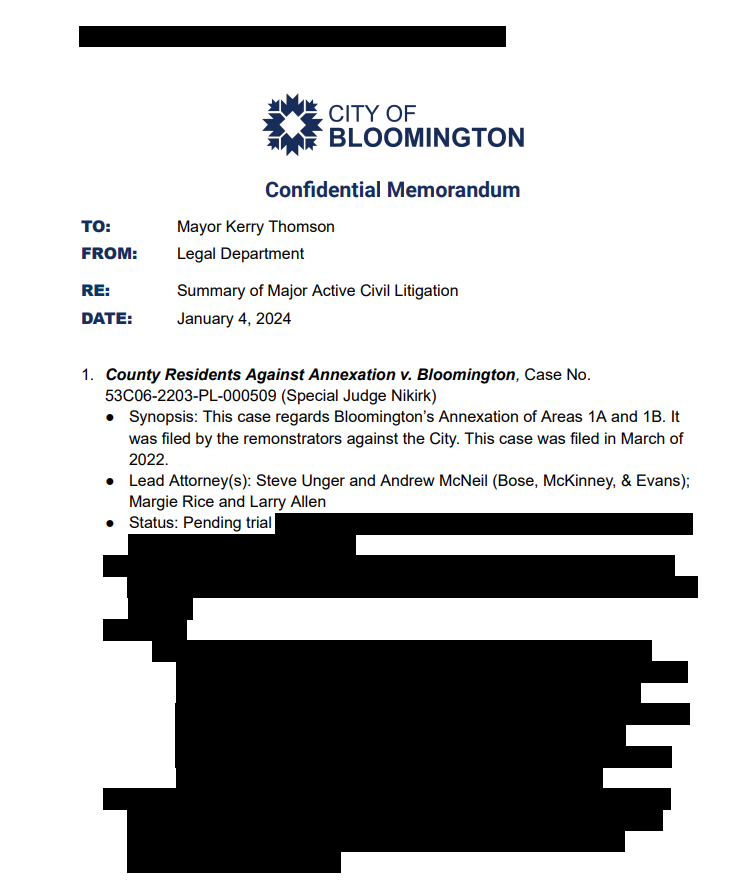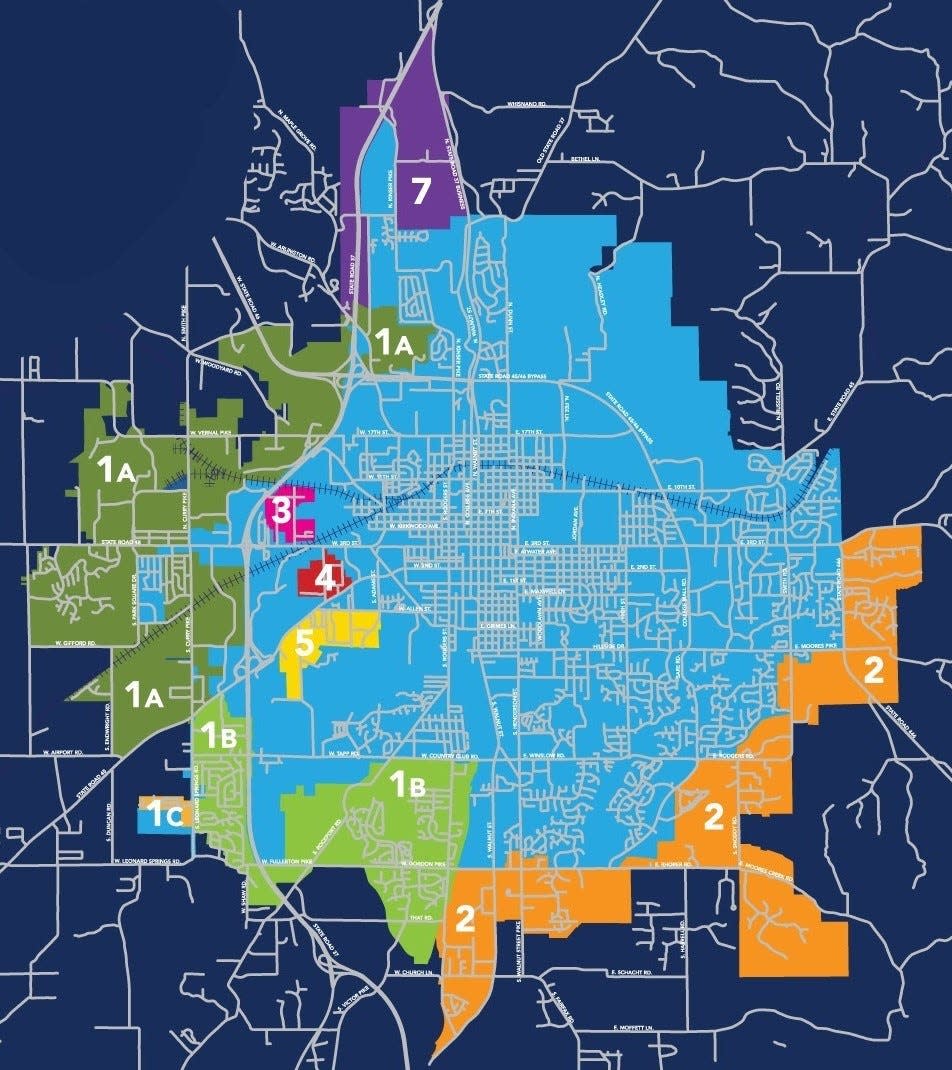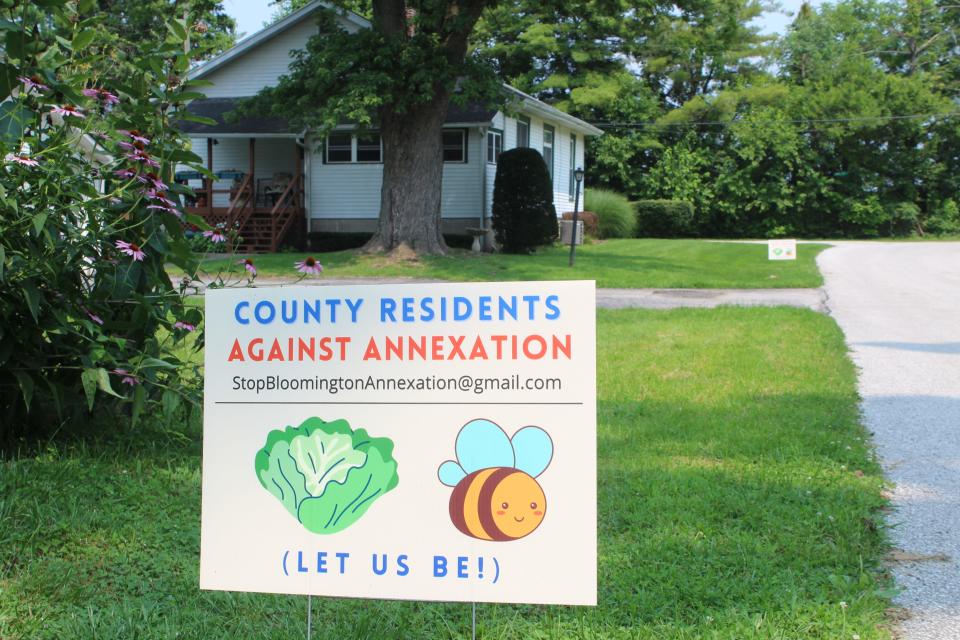Bloomington mayor says city 'not pulling out of' annexation cases, will let judges decide

Bloomington’s annexation lawsuits will continue, the city’s new mayor, Kerry Thomson, has decided.
“We are proceeding with the annexation hearings, and the judge will decide that for us,” Thomson said last week in her office at city hall.
The planned annexation, begun by Thomson’s predecessor, John Hamilton, who left office in December, would expand the city's borders and move about 14,300 residents into the city limits.
However, the matter is tied up in two court cases. A hearing in one case scheduled for Friday was canceled. A trial in the second case is scheduled to begin in late April.
Thomson had indicated before last year's primary election she may "halt" the process if elected mayor. She said she would want to allow time for more communication and to address concerns from county officials and affected county residents — though she said her approach might result in annexation proceeding unchanged in scope and size. One of Thomson's primary opponents, Susan Sandberg, then a city council member, said she would want to stop annexation altogether.
Thomson's administration announced Jan. 5 that the mayor had ordered internal reviews of city matters including litigation and had charged Corporation Counsel Margie Rice with leading a "review (of) all cases, the value to taxpayers and (to) make recommendations to Thomson on whether the City should continue with the litigation."
That audit was completed by Jan. 12, and the mayor's office initially appeared willing to provide information about the audit once the mayor reviewed the recommendations. However, the office said via email on Jan. 23 that it would not be releasing the information "at this point" as the review included "sensitive information on pending legal matters."
Rice said the legal department's review of the cases was protected by attorney client privilege. A document the city provided after the H-T filed a public records request included basic information about the cases but was largely redacted.

Thomson said Tuesday she will leave the annexation decisions with the courts.
"I remain open to talking to the county residents about timeline and other things that might make this better, but (we are) not pulling out of the suits," she said.
Margaret Clements, president of the nonprofit County Residents Against Annexation, said Friday Thomson’s decision is disappointing for the affected residents who had hoped the new mayor might take a different approach than Hamilton.
“I never held too much hope that anything would happen other than the suits would go forward … because it's so far into the process,” Clements said.
“At the same time, I think it hinders the community's ability to heal and to move together as one,” she said. “The longer this goes on, the more division that exists between the city and the county, and the more animosity that is held in the hearts of the residents who live here, and that is disappointing for them.”
Annexation-related court hearing canceled unexpectedly
An annexation-related court hearing was canceled at the last minute on Friday.
More than 20 people had taken seats in a courtroom on the second floor of the Charlotte Zietlow Justice Center on College Avenue at 11 a.m. Friday, but a court official said about 20 minutes later the scheduled hearing would not take place.
The court did not immediately have information about the reason for the cancellation, but Judge Kelsey B. Hanlon, an Owen County judge, said in a court filing Friday afternoon that she was recusing herself from the case “due to a recently discovered potential conflict of interest.”
A new date for the hearing had not been set as of Friday afternoon.
Bloomington annexation plan proves contentious

Hamilton announced the annexation plan in 2017, but the process was delayed by a last-minute addendum to the state budget bill that year. The city sued, and the state's supreme court later ruled the Legislature’s actions were unconstitutional. Hamilton continued the effort in 2021.
The Bloomington City Council in late 2021 approved the mayor’s plan, with slight alterations, by a 6-3 vote.
After council action, the plan called for the city to annex 8,200 acres and 14,300 residents who live on the city’s west, southwest and southeast borders. Some of the residents the city hopes to annex also live in three “islands” that are surrounded by Bloomington on the city’s west side.
Hamilton said the proposal aimed to “right-size” the city, which has not expanded its boundaries since 2004, despite significant growth at its borders. He also said the areas he targeted for annexation had, for many years, been envisioned as future city neighborhoods.
However, the plan elicited significant opposition among affected residents, some of whom said they did not want to pay additional property taxes for few, if any, added services they would find useful. All three Monroe County commissioners, too, opposed the plan, primarily because it would slow the county government’s revenue growth, which, they said, would make it more difficult to fund some government activities and to tackle big challenges related to criminal justice.
County commissioners Julie Thomas and Penny Githens said they have had no recent conversations with Thomson about annexation and remain opposed to annexation.
"The issues we highlighted in previous years have not changed," said Thomas, president of the commissioners.
"Residents who are on a fixed income are concerned about the impact of the tax increase. We heard from residents throughout the county (including residents of the city) who are concerned about the fiscal impact of an annexation on the City’s budget. It would certainly have a negative impact on the county’s finances," Thomas said via email.
Githens, vice president of the commissioners, criticized the city's track record on annexation.
"At least two decades ago the City of Bloomington annexed the Broadview area. If you do a search on Google maps, you will see that streets like Cherokee and W Chambers Drive do not have storm drains or sidewalks, which were some of the amenities the City was touting as 'possible' with annexation," she said via email.
Githens, who lives in the city limits, also said she worries about the impact of annexation on public safety.
"The Bloomington Police Force continues to be understaffed, and if additional areas are added to the city boundaries, even more police officers will be needed," she said.
Formal opposition to Bloomington annexation

Many property owners in the targeted areas formally opposed Hamilton's plan by filing remonstrance petitions during a three-month period that ended in January 2022. Catherine Smith, then Monroe County auditor, on Feb. 23, 2022 announced opponents had filed enough petitions to stop the annexation attempt in five of seven areas. Opponents in two other areas filed enough petitions to allow them to challenge the annexation in court.
Those two areas, 1a and 1b, on the city’s west and southwest sides, have a combined 8,553 residents. In March 2022 more than two dozen residents from those areas sued the city, Hamilton and other parties to stop the annexation effort. A trial in that case is scheduled for late April/early May.
In a separate case, for which the hearing was to be held Friday, the city challenged the outcome of the remonstrance process because a law adopted by the state Legislature in 2019 allowed significantly more people to file remonstrance petitions. The city has argued in court that the law is unconstitutional and, in any case, should not apply to Bloomington's effort because the law was adopted after the city began the annexation process.
The city has said without the law, the remonstrance efforts in all but two of the seven annexation areas would have failed, meaning five of the areas would be annexed, and the other two would have to challenge annexation in court.
Boris Ladwig can be reached at bladwig@heraldt.com.
This article originally appeared on The Herald-Times: Bloomington's new mayor won't stop annexation court cases

